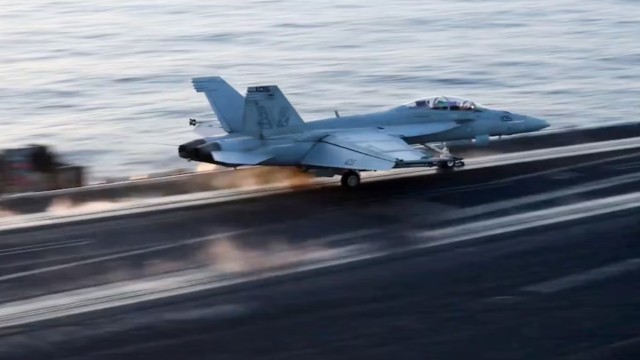
This image taken from video provided by the U.S. Navy shows an aircraft launching from the USS Harry S. Truman in the Red Sea before airstrikes in Sanaa, Yemen, on March 15, 2025.
In an unexpected move, President Donald Trump revealed on Tuesday that the United States would stop bombing the Houthis in Yemen. This announcement came after weeks of intense military action and mounting tensions between the two sides. Trump stated that the Houthis had pledged to cease attacks on U.S. ships in the Red Sea, marking a significant shift in the ongoing conflict.
A Step Toward Peace?
Speaking during a photo-op with Canadian Prime Minister Mark Carney, Trump expressed confidence that the Houthis no longer wished to continue fighting. "They've announced to us that they don't want to fight anymore," Trump said, adding that the U.S. would honor the Houthis' commitment to peace. "They say they will not be blowing up ships anymore," he added, signaling an end to the hostilities.
Oman's Foreign Ministry also confirmed the ceasefire agreement, stating that the deal was the result of efforts by Oman to mediate discussions between the U.S. and Houthi representatives. According to a statement from Oman, both sides agreed to refrain from targeting each other, including U.S. vessels in key maritime routes like the Red Sea and Bab al-Mandab Strait. This agreement aims to ensure the safety and uninterrupted flow of international shipping.
Houthis Not Ready to Commit
However, not everyone seemed convinced that peace was at hand. Mohammed Ali al Houthi, a leader in the Houthi political council, took to social media to express caution. He stated that the Houthis would need to "evaluate" the U.S. ceasefire proposal on the ground before making any formal commitments.
Despite this, Trump appeared optimistic, claiming that the U.S. military had already been ordered to halt its airstrikes on Houthi targets. When questioned about how the ceasefire came together, the president offered limited details, simply stating, "They don't want to be bombed anymore."
Strikes and Escalation
The announcement followed a period of intense military engagement between the U.S. and the Houthis. Since March 15, the U.S. military had launched over 800 airstrikes in Yemen, with one attack on the Ras Isa fuel port on April 18 claiming the lives of at least 74 people. However, the U.S. also suffered casualties, losing seven Reaper drones and a fighter jet in the course of operations. The latter incident, which saw an F/A-18E jet fall off the USS Harry S. Truman, was reportedly linked to Houthi fire.
As the U.S. military faced significant losses, the Israeli military also conducted airstrikes on Yemen in response to Houthi strikes against Israel. These attacks targeted various sites, including Yemen's main Red Sea port and military infrastructure.

A Long-standing Conflict
The conflict in the Red Sea between the Houthis and U.S. and British vessels began in October 2023, when the Houthis announced they would target ships connected to Israel's allies. This move came in response to Israel's military actions in Gaza following the Hamas attack on October 7, 2023. Since then, Houthi forces have repeatedly targeted vessels in the region, escalating the situation.
Trump referred to the U.S. mission in Yemen as a "freedom of navigation" operation, aiming to protect international shipping routes. Despite this, the Houthis’ ongoing threats against Israel have remained a point of contention. When asked about these threats, Trump responded that he was unaware of them, though he emphasized that the Houthis had expressed no desire for further conflict with the U.S.
Political Shake-ups and Uncertainty
This announcement came amidst turmoil within the Trump administration. The president recently reshuffled his national security team, including the dismissal of National Security Advisor Mike Waltz and Defense Secretary Pete Hegseth, both of whom had been involved in planning the attacks on Yemen. The situation was complicated further when a journalist accidentally gained access to a Signal group chat revealing sensitive planning details.
The Trump administration now faces questions about its handling of the conflict, especially after the recent loss of military assets and growing international scrutiny over its actions in the region. Despite the challenges, President Trump’s latest announcement represents a significant de-escalation in the U.S. approach to the Houthis, though the outcome remains uncertain.















